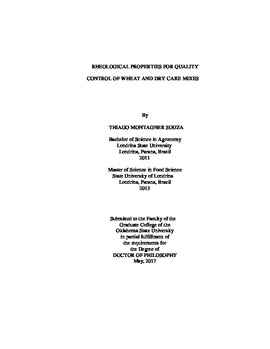| dc.contributor.advisor | Rayas-Duarte, Patricia | |
| dc.contributor.author | Montagner Souza, Thiago | |
| dc.date.accessioned | 2018-03-13T18:16:09Z | |
| dc.date.available | 2018-03-13T18:16:09Z | |
| dc.date.issued | 2017-05 | |
| dc.identifier.uri | https://hdl.handle.net/11244/54575 | |
| dc.description.abstract | Faced with market demand, segments of the industry must be focused on the production of quality food, which is a determining factor in competitiveness in the international market. The quality of raw materials and finished products is important and can be affected by a number of factors. The rheological properties effect on product quality and nutrition have been thoroughly investigated as they relate to the chemical composition and physical characteristics of foods. In the first part of the study, the objective was to evaluate the impact of agricultural management practices (crop succession and nitrogen fertilization) in the quality of grain produced. For the experimental conditions tested, increasing nitrogen applied in broadcast in succession with soybean crop increased protein and reduced starch content in the wheat kernels (wholemeal; p<0.05). Those changes in composition consequently affected the rheological properties, increasing the elastic recovery of the gluten and reducing the pasting properties of the paste (p<0.05). In the second part, the objective was to determine the best conditions for extraction and analysis of gluten viscoelastic from a set of soft wheat genotypes, and its correlation with standard viscoelastic methods. The best conditions for gluten extraction and analysis were obtained with 4.4 mL of water, 20 s of mixing and 3 min of washing with NaCl solution (2%). The elastic recovery of gluten presented a strong correlation with standard methods used to classify wheat according to its technological quality (r>0.95; p<0.01). In the third part, the objective was to evaluate the effect of functional ingredients on pasting properties (RVA) of cake mixes (all-purpose flour or gluten-free) and baking performance, texture and sensory characteristics of the baked product. The misformulation of the ingredients (NFDM, salt and baking powder) resulted in significant changes in the pasting properties, presenting similar responses for all-purpose or gluten free cake mix formulation (p<0.05). Baking performance, acceptance and texture of the baked products were also affected, with omission (gluten-free) or double dose addition (all-purpose) of baking powder being the less acceptable cake produce from the misformulations tested (0.40<r<0.90; p<0.05). The pasting properties of the mix presented moderate to strong correlation with baking performance (volume and weight) and texture of the baked products. | |
| dc.format | application/pdf | |
| dc.language | en_US | |
| dc.rights | Copyright is held by the author who has granted the Oklahoma State University Library the non-exclusive right to share this material in its institutional repository. Contact Digital Library Services at lib-dls@okstate.edu or 405-744-9161 for the permission policy on the use, reproduction or distribution of this material. | |
| dc.title | Rheological properties for quality control of wheat and dry cake mixes | |
| dc.contributor.committeeMember | Ramanathan, Ranjith | |
| dc.contributor.committeeMember | Payton, Mark Edward | |
| dc.contributor.committeeMember | Edwards, Jeffrey Todd | |
| osu.filename | MontagnerSouza_okstate_0664D_15135.pdf | |
| osu.accesstype | Open Access | |
| dc.type.genre | Dissertation | |
| dc.type.material | Text | |
| thesis.degree.discipline | Food Science | |
| thesis.degree.grantor | Oklahoma State University | |
